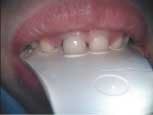Most parents have experienced the alarm at one time or another of losing track of a child in a public location. The sunken feeling, emotional dread, and grip of panic are replaced immediately with joy once the child is quickly located. Unfortunately, there are startling statistics from the National Incidence Study of Missing, Abducted, Runaway, and Thrown Away Children, which estimates some 2,000 children are reported lost every day. As dental professionals, we hold a unique position where the records we gather daily play an ever-increasing role in personal identification. When opportunities arise for promoting dentistry at a community level, we can find reward in reaching out and becoming part of an event designed to protect and I.D. children.
A worthwhile experience for your office to reach out to the community and care about kids is to host a dental imprinting day using Toothprints® by Kerr. Toothprints hold a bite plate full of crucial DNA information. The Toothprint is placed on the lower teeth so that the child can bite firmly into the recording plate. With each registration, the residual saliva and bite relationship are deposited on the thermoplastic material. With this highly specific information tucked in a plastic bag, a well-trained police dog can pick up a scent, enabling authorities to identify and locate a lost child.
Community events where many children are present are ideal locations to offer this imprinting service. School carnivals, church picnics, county fairs, and back-to-school events are all examples of functions well-attended by children. Informational brochures and flyers on Toothprints can be distributed from your booth. Colorful posters and balloons further gain attention and make an attractive, eye-catching display to decorate the space. Stickers, coloring pages, and trinkets can be incentives for those children who participate. Position your booth next to the traditional police fingerprinting area, if available.
Working with the local police department offers a new way for dentistry to impact crucial search and recovery efforts. The police officers we talked with at our community event were intrigued and supportive of our endeavor, and believed Toothprints would be a welcome means of identification in times of crisis.
Toothprints come economically supplied in a box of 25 plates, accompanied by plastic bags for labeling and storage. Toothprint kits, 100 plates, and informational brochures can be purchased for your event from Kerr at $2.50 per plate. Practices will find Toothprints a minimal investment for maximum community impact.
Warming up to the community
To take a registration, the bite material must be warmed and pliant. A crock pot full of water can serve as a softening station and will successfully reach the 170-degree temperature needed to ready the plate. Totally immerse the disc for 15 to 30 seconds. For the occasion, plan on having one team member at the softening station and another to perform the actual oral insertion of the Toothprint. Enlist other team members to gather parental signatures allowing your office to take the registration, and have them label each storage bag with the child’s name and date the service was performed. Still other members of your group can “work the crowd” by drawing parents and children to your booth. These team members can enlighten the public about Toothprints: “Our office is providing a service called Toothprints for your child. This is a quick and painless registration that will hold pertinent information to assist police in the unlikely event your child becomes lost or abducted. Please take advantage of this free service provided for you and your family today by our dental team.”
Once the registration has been taken, the thermoplastic wafer will harden when removed from the mouth. After the Toothprint has set, simply place the saliva-rich wafer into the labeled plastic bag and give it to the parent for safekeeping. Instruct the parent to store the bag in a dark location that is easily accessible should the plate be needed.
Although Toothprints will require updating, at the onset of implementing such a community program, first consider the benefits to all children and do not limit them due to mixed dentition. A Toothprint can be taken at different tooth-eruption stages to record maturing bites, and will need repeating periodically. Recommend that parents have the imprint redone yearly if possible. Unfortunately, a majority of missing children are older adolescents and teenagers (ages 12 to 17). This age group accounts for about three-fourths of all missing children. (Source: United States Department of Justice) Consequently, imprinting remains a need for older children as well.
As a general guide, record bites on cooperative children as early as age 3 when all primary teeth have erupted, then again after first molars and canines have come in at about age 12, and again when second molars are present. Most likely, the child going through mixed dentition when the registration was taken will have lost and gained teeth, altering the bite, so consistent registrations keep plates current. However, the saliva DNA will remain unchanged. Like fingerprints, each child’s bite registration is solely his own. This individuality will serve as a mode of matchless identification.
At our community event, parents commented about how they valued the service offered by our office and appreciated the connection our team had in caring for local children. Existing patients will see the efforts performed by your team and tell others, “That’s my dental office doing those registrations.” For us, this nonthreatening dental experience also prompted would-be patients to ask dental questions they had for their own smile without having to call the office. (Be prepared with business cards and even the appointment book!)
What a wonderful way for dental professionals to get involved in the community and offer a fun, free service so vital to children, which also offers peace of mind to their parents.
Karen Kaiser, RDH
Ms. Kaiser has been in the dental field since 1986. She graduated from St. Louis, Mo., Forest Park hygiene program in 1994 and practices in Illinois at the Center for Contemporary Dentistry. Ms. Kaiser authors articles, presents, and can be reached at At Your Fingertips: hygiene [email protected].








